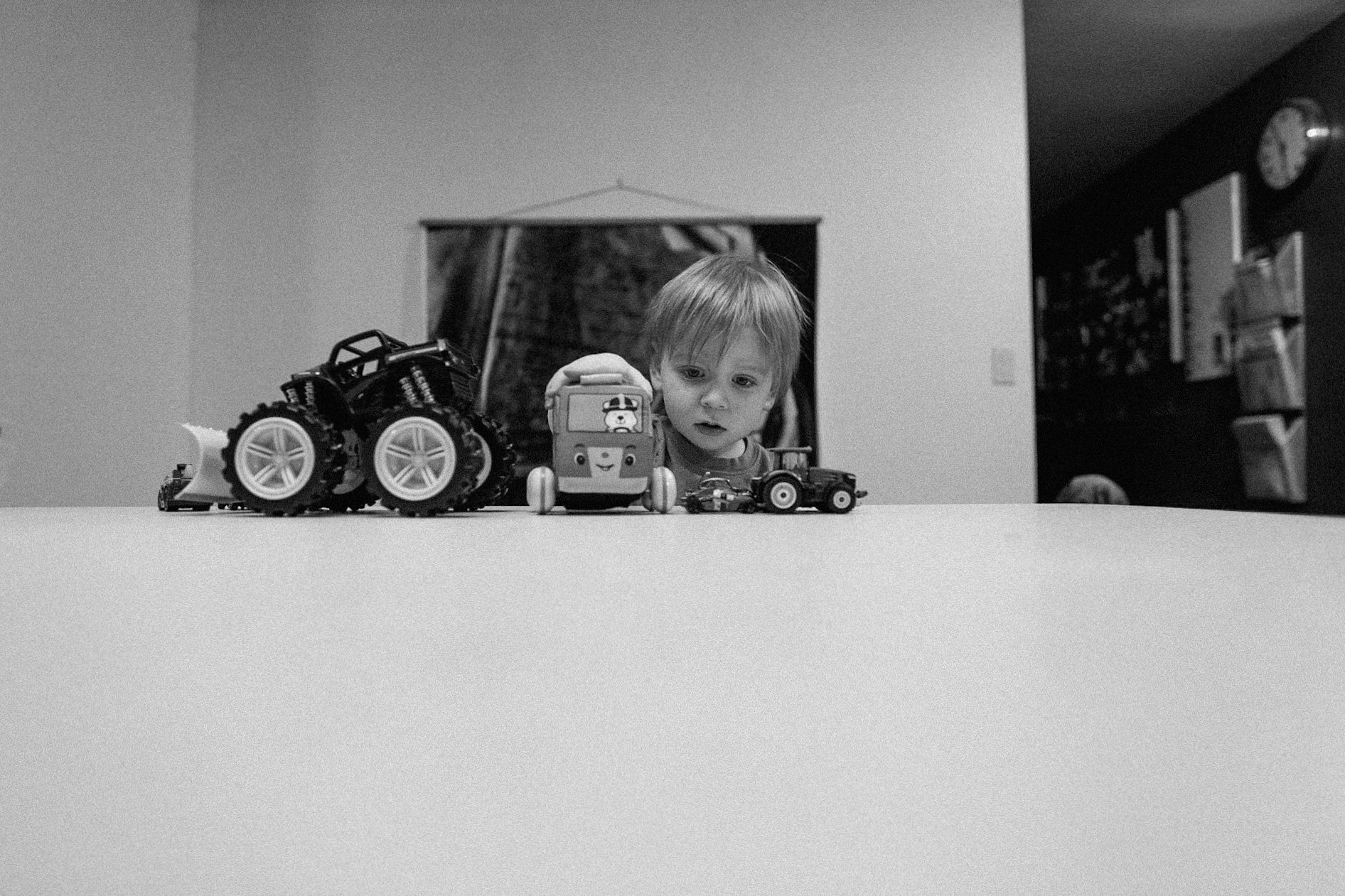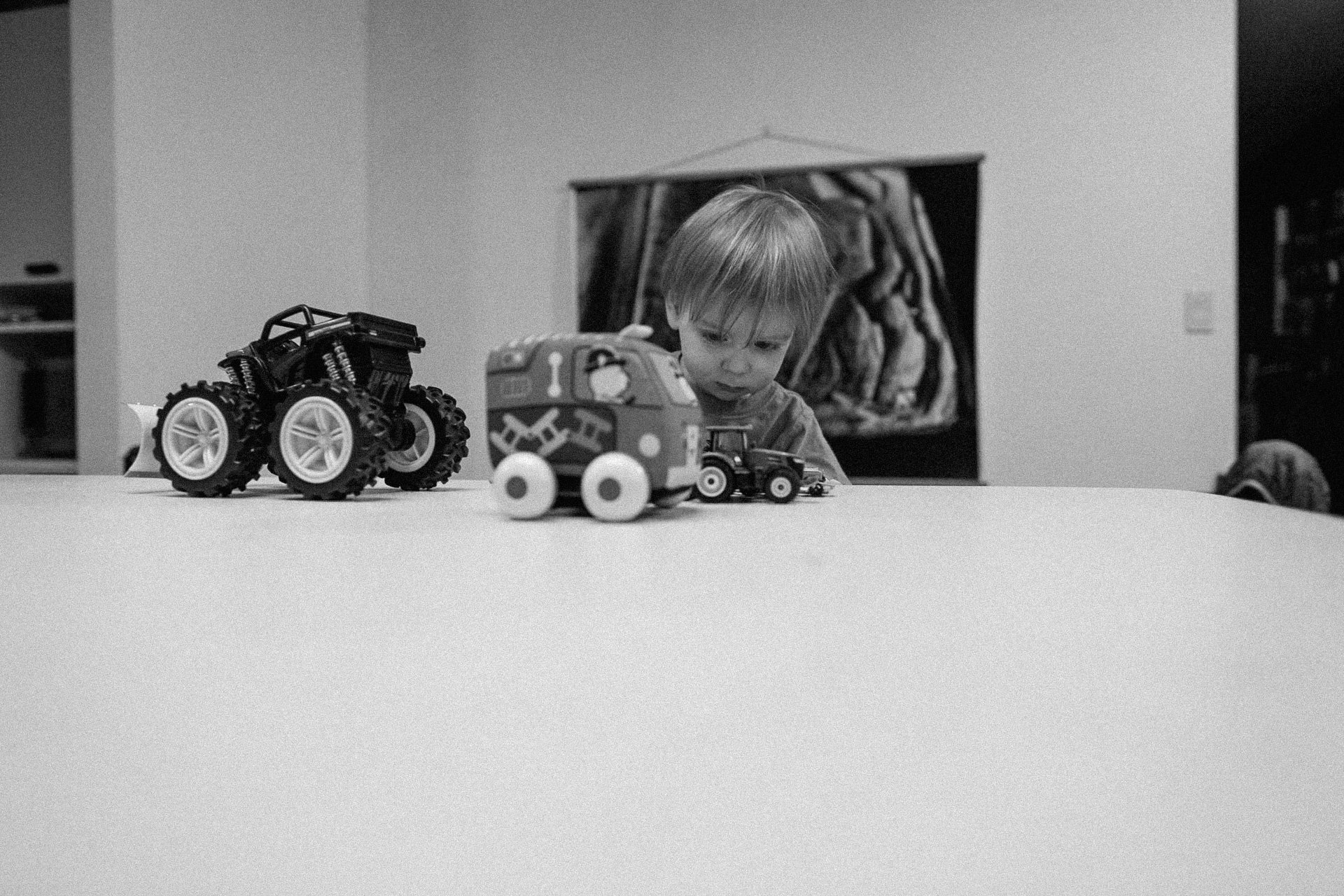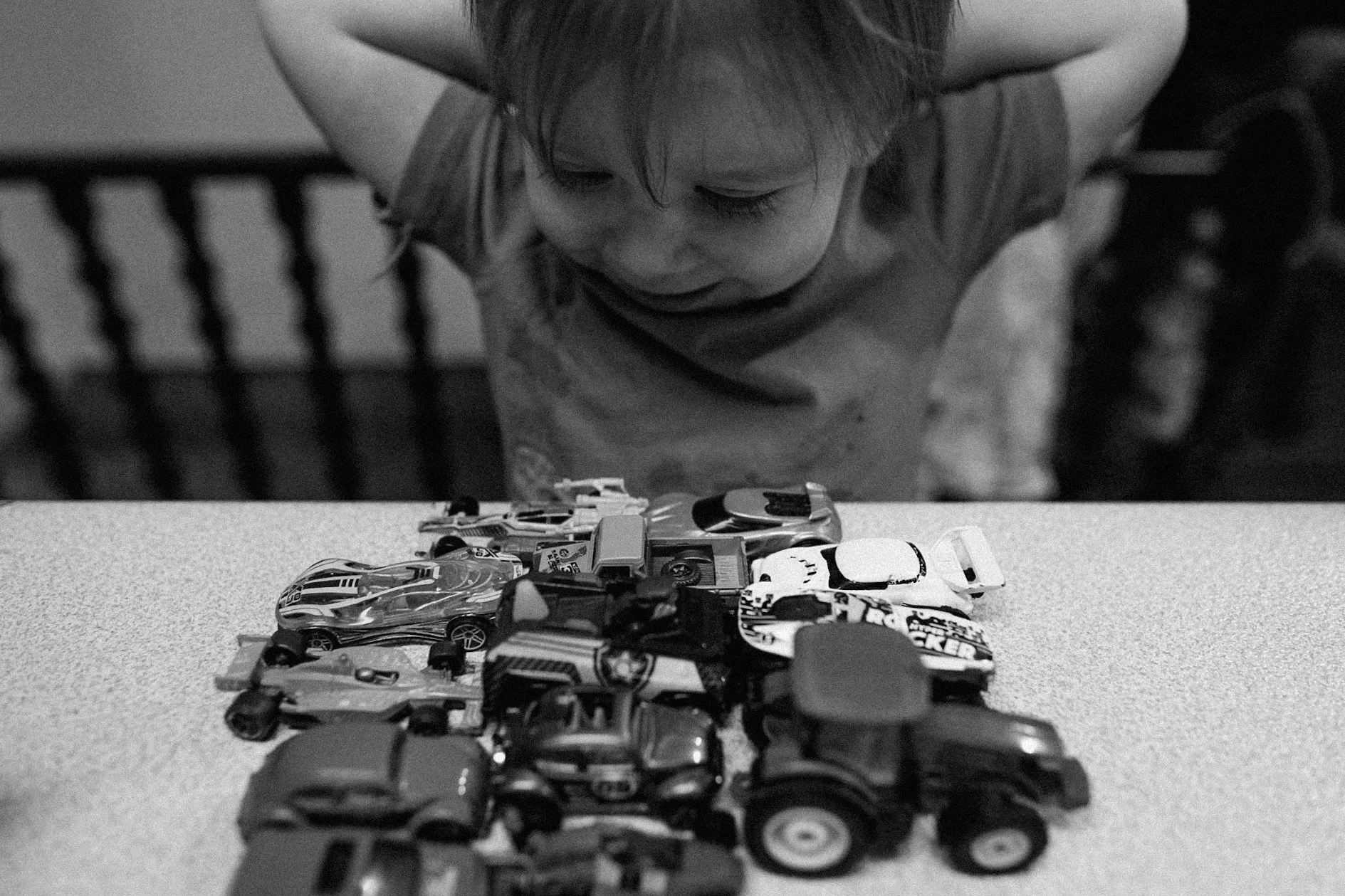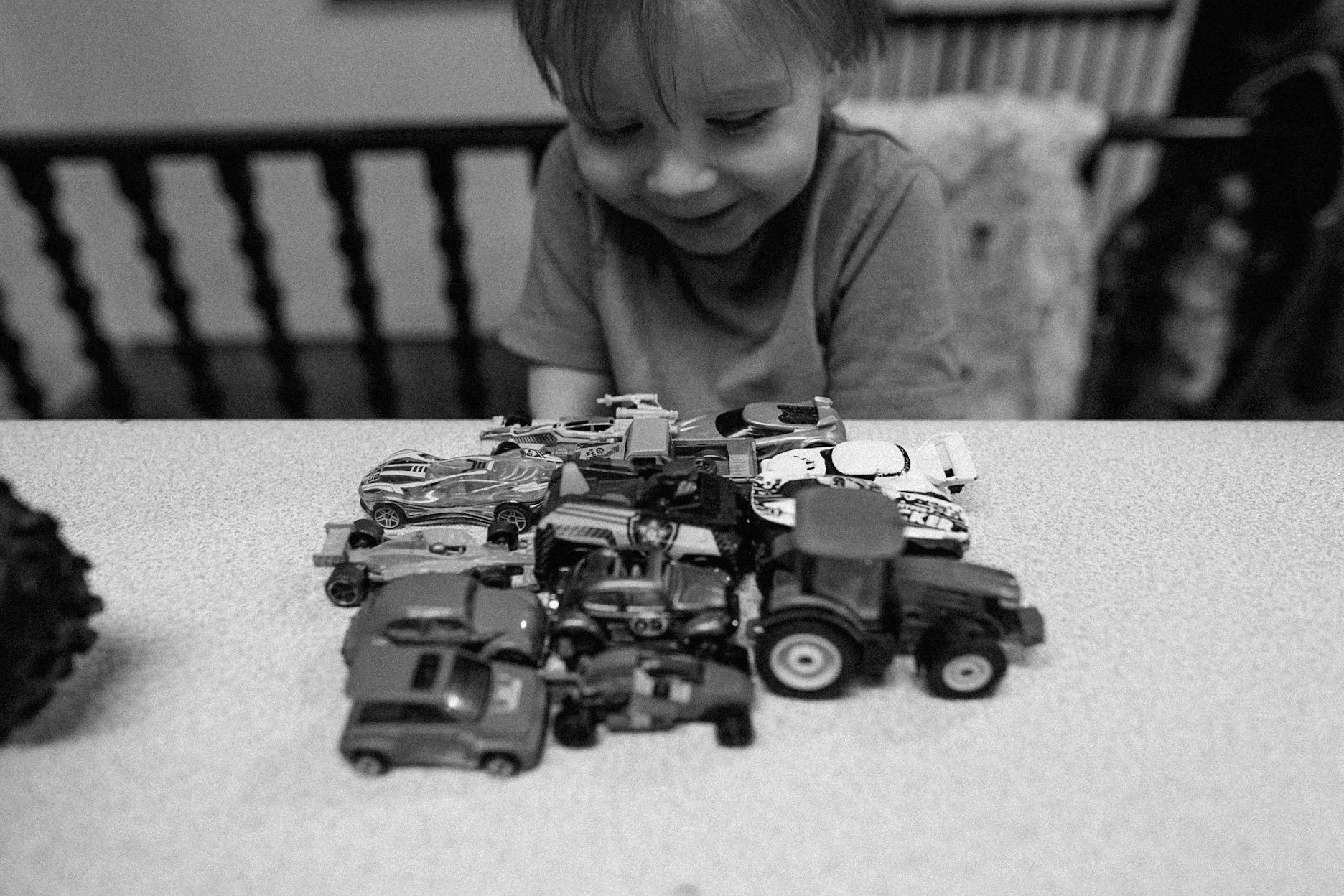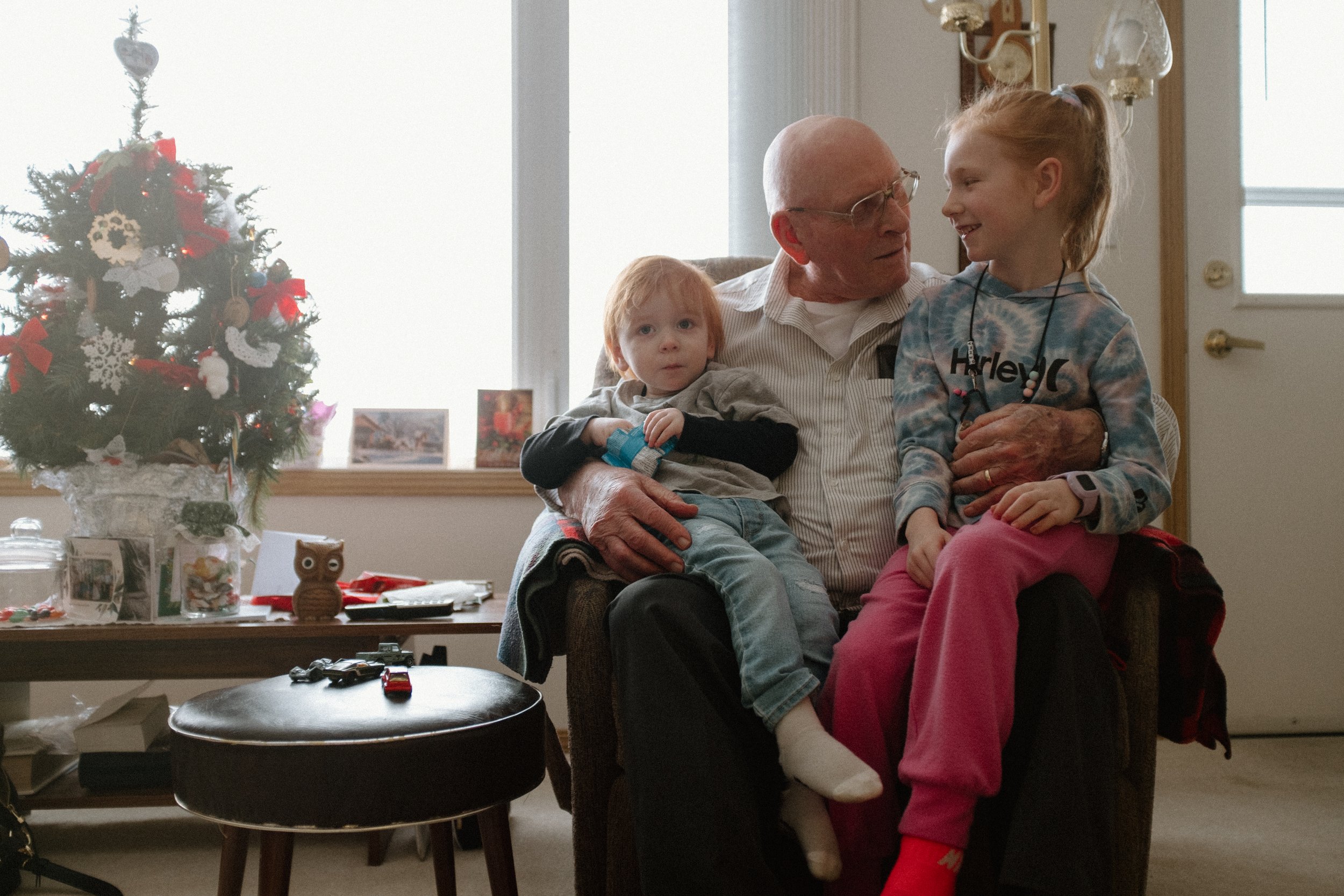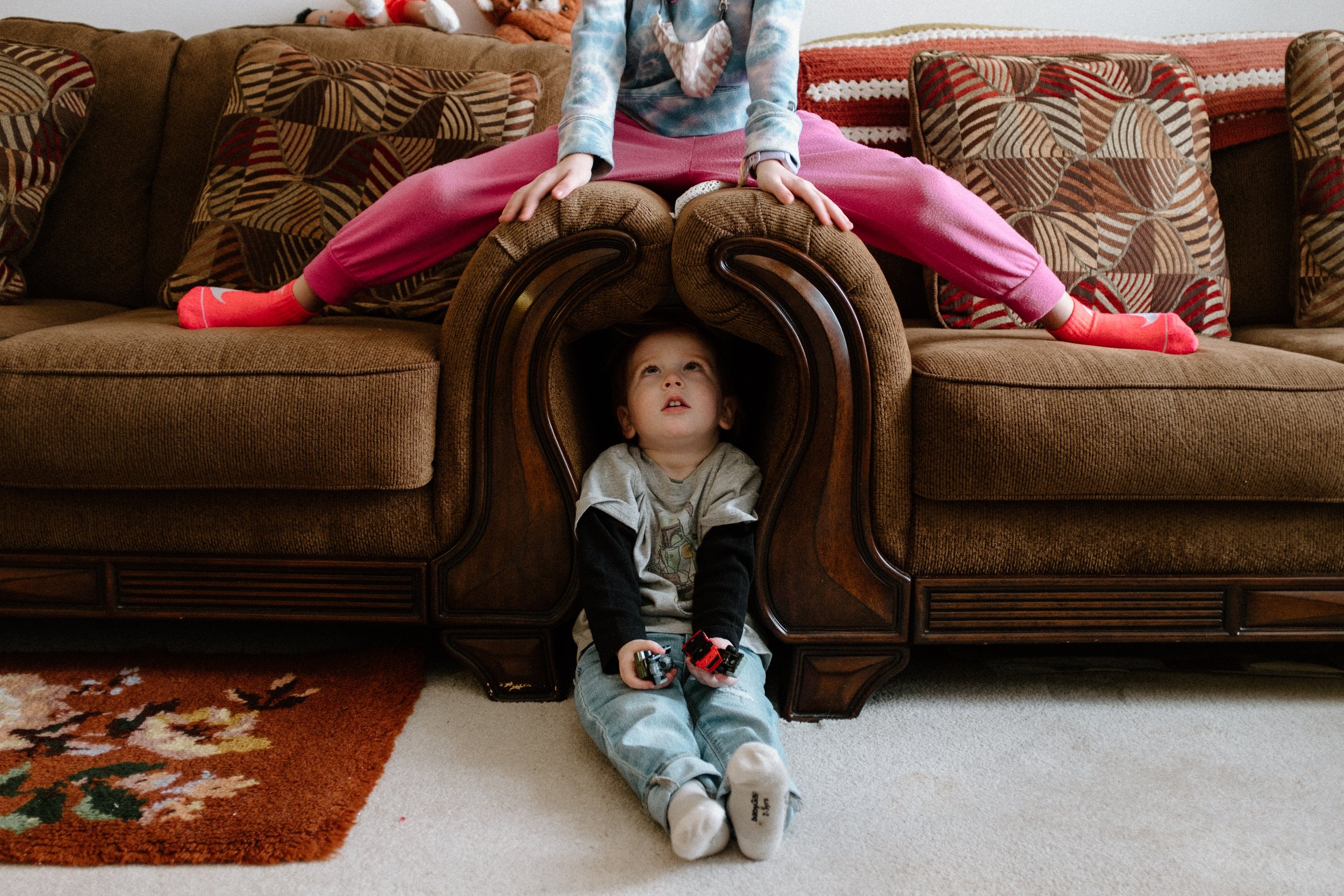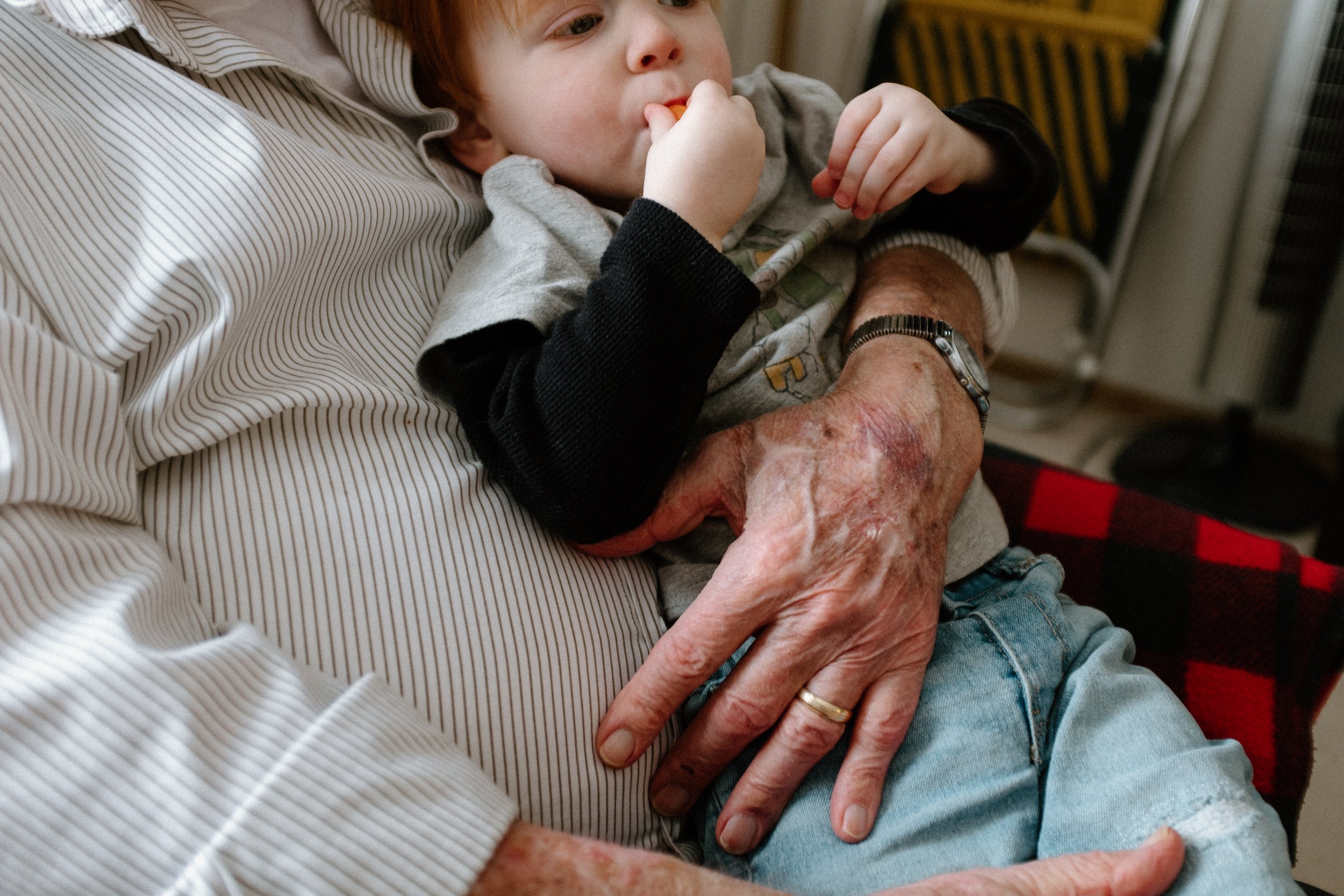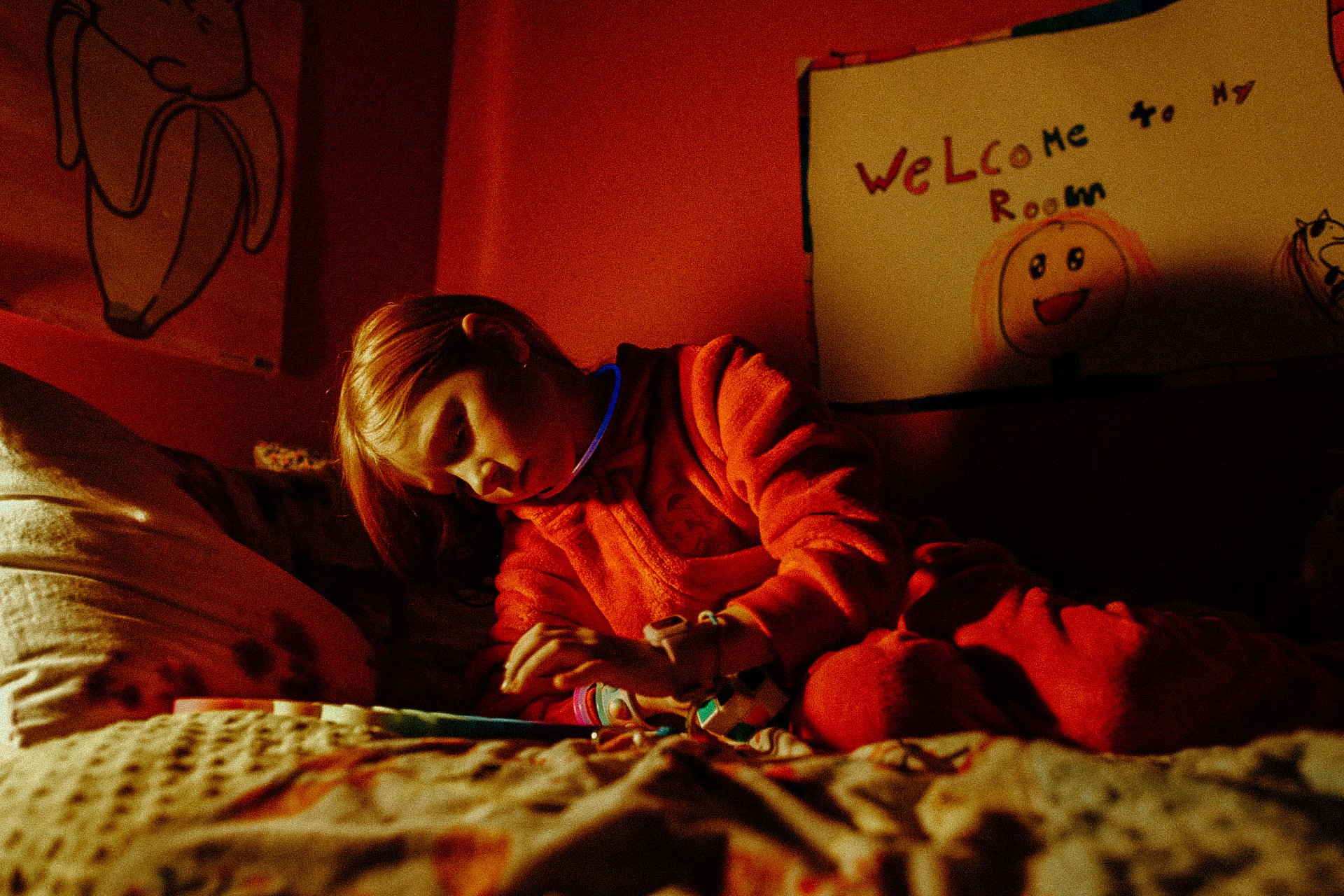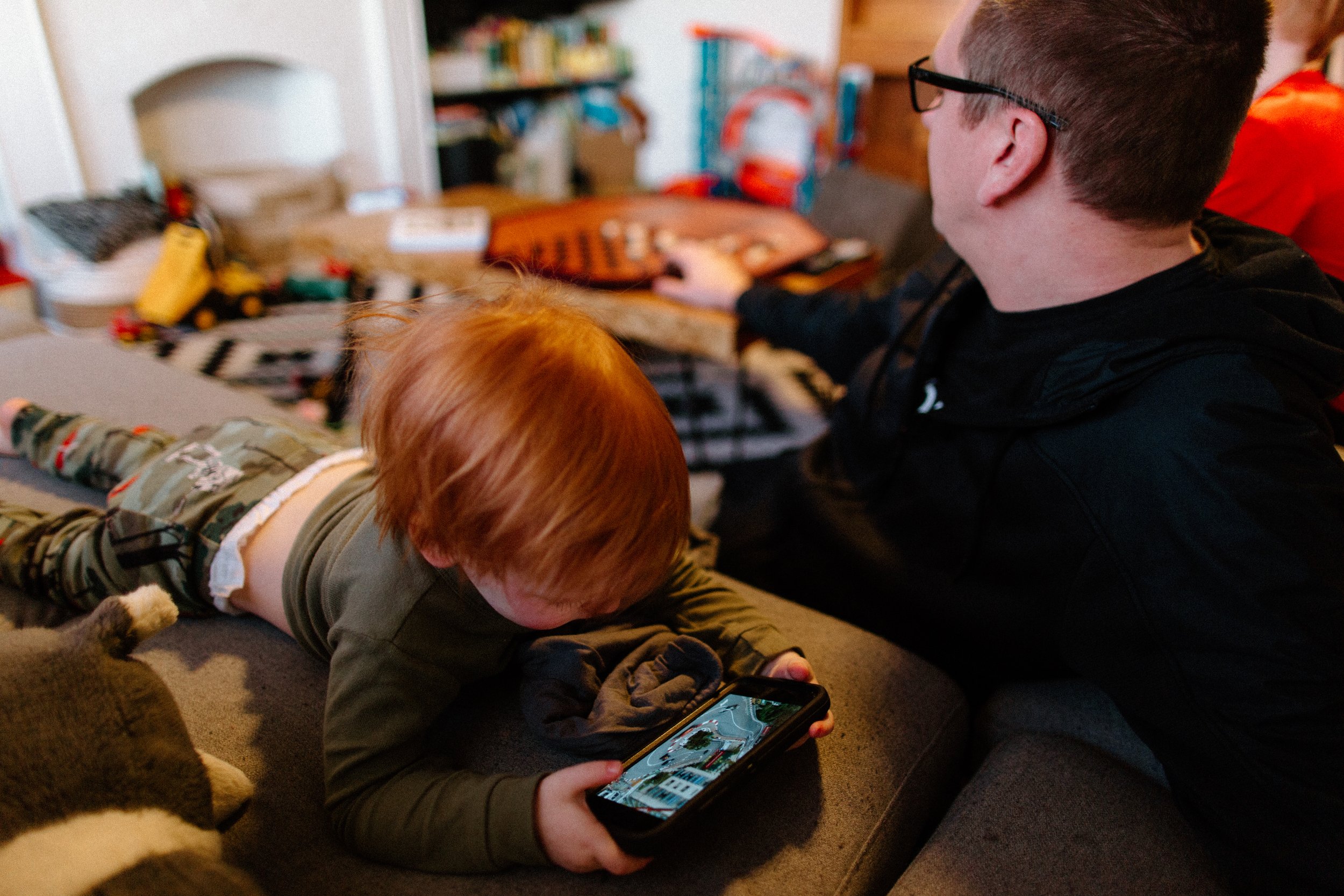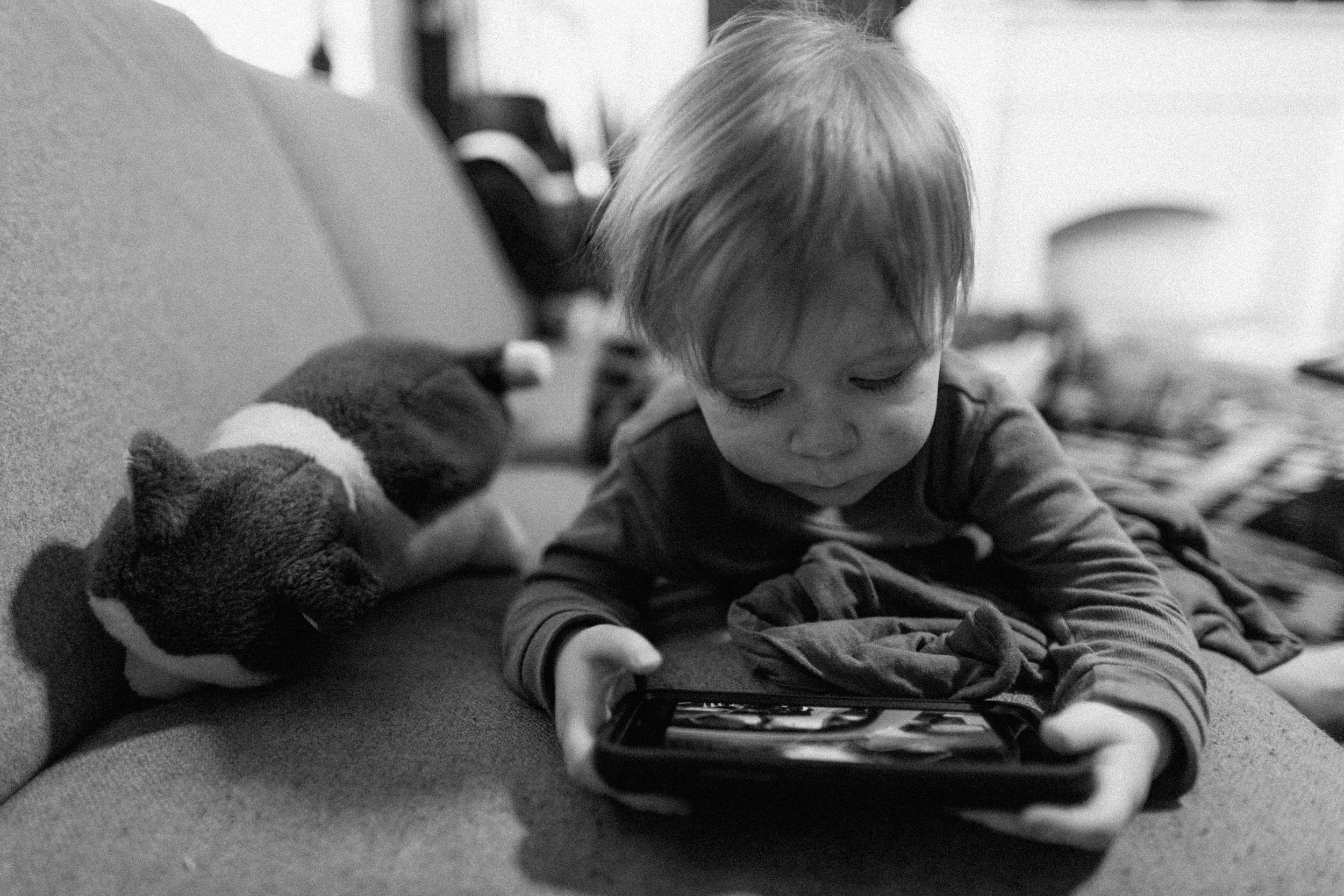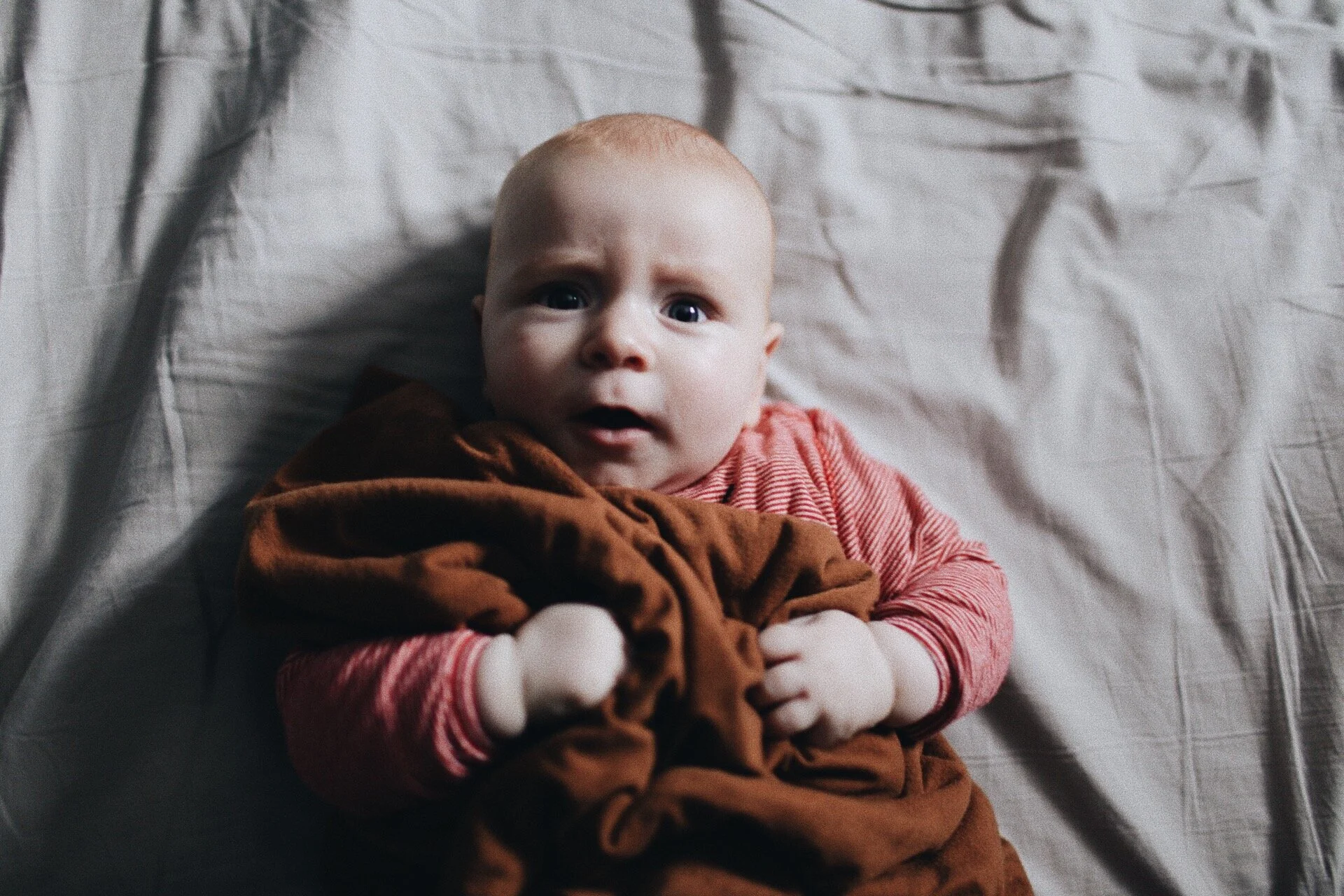01 03 2022 ‘Jelly Bean Grandpa’ /
A visit with my grandparents, jelly beans and Grandpa’s mandolins.
01 02 2022 ‘Mom, take a picture of my room’ /
This girl and ALL the stuffed animals.
Personal project, year two /
Two years ago, I committed to taking (but mostly sharing) a photo every day for a year. Little did I know that I would be documenting our family during a pandemic for most of 2020. I decided to continue the project for another year but 2021 started off with loss and profound grief, which left me with just enough energy to maintain the minimum and next to nothing for flexing creative muscles.
I decided to give the daily project a chance again.
In the first twenty days of this endeavour, there have been days where I haven’t had the energy to photograph anything and days when the inspiration is overwhelming. Choosing just one photo is difficult—perhaps that is an unintentional challenge for me in 2022–since the style of photography I naturally gravitate to is documentary. I see this reflecting in my writing too. I want to be a storyteller in every sense.
Posting only one photo on social media doesn’t tell the whole story, as we all well know, and this space has been significantly under-utilized, in general and for my photography. So here is my intention: I will continue to post my one photo on social, but I’ll make a concentrated effort to share the rest of the story here.
//
Below are a few photos from our first day of 2022 - our youngest was upset about something not going his way but when Dad brought out a video of Max Verstappen in a F1 race, his problems disappeared.
Celebrating a life /
Code Red has made it next to impossible to give others the opportunity to grieve with us and to celebrate her life collectively as friends and loved ones. There is much about the pandemic that has been difficult, and these limitations on being with each other have been some of the most trying.
Yesterday afternoon, we dressed in our best and I applied mascara in honour of the lady who rarely went without hers. Our immediate family gathered in the cemetery, around a beautiful casket built for our beautiful Momma. We shared - words, prayers, songs, hugs and tears. It was a beautifully intimate celebration of who she was to us, the tree beside her grave covered in frost and us tucked into the fog. And as we were leaving that sacred space, the sun broke through and covered us in its light.
I’m leaving the words I wrote to share yesterday below, in a very small effort to allow others to be a part of a larger service that we couldn’t have. They feel incomplete without being accompanied by the rest of what was spoken but perhaps these words will be able to act as a stand-in for someone.
‘You just do it’ - This is what she told me years ago when I was feeling overwhelmed by a toddler and a baby, when I had asked mom how she did everything - gardening and taking care of us kids and helping dad in the field.
It’s been the advice I remember the most - because she just did it all. Without complaining and usually, what seemed to be eagerly. I’m not sure if this was what she wanted me to hang on to most but it is, because I saw her live this out every day. I saw this when we were young, at home and in our church, and I saw this as her body began to fail. I don’t believe she said this to me, intending to keep her response so brief, because I think she was already having a hard time talking much. I think if she had been able to find the extra words she would have told me that she didn’t do it on her own, that it was strength you gained by leaning into God and your faith. That because of that, she wasn’t uniquely gifted to do ‘this’, and that I could do it too. And sometimes, the dishes just needed to be done and so you have to do them. (She always knew dishes were my least favorite chore)
Not only did she get things done because they had to be done, but she was also bold and seemingly unafraid to try new things. I remember her often learning something - learning folk art painting and taking piano lessons, willow furniture building classes or joining a women’s hockey team. While I’m sure she felt nervous or some trepidation during those times, I saw her unwilling to miss out on something fun, creative or new for that reason.
Her zeal for life was not reserved just for her either. She was just as enthusiastic, if not moreso, about the things we (her children) attempted. There are very few things I can think of that I have done, that she didn’t strongly encourage me to start or continue with. She truly was her family’s biggest cheerleader, no matter what it was. In fact, there are many things I have done because she pushed me to be brave and try, that I otherwise wouldn’t have.
I didn’t remember myself participating (or enjoying participating) in a lot of activities as a kid that naturally had people in the stands cheering one on, but I do remember traveling to Brandon for a couple track meets in high school. I was hardly the best on the track but Mom was there in the stands every time, cheering me on in the last 50 meters as if I was.
I think this is what I will miss the most - knowing that she is not here with us to be our biggest fan and supporter. Even in the last few years when communicating was difficult and limited at the best of times, she was who I went to when I needed that push to keep going, when I had (or have) no idea what I’m doing. She was always there for me, ready to listen and often her response seemed to be ‘You can do it. I believe in you.’
She leaves us here, sad and yet rejoicing. And I do think in the times when I question how I’m going to do this life without her expressive eyes, her laugh and her slow blinks for yes or no, her advice to me would be ‘you just do it’. Mom never promised me that a solution would be easy or that it would be too hard for me to manage and I don’t think she would change her answer for me, for us, now. She just always directed me back to prayer, to ask God for the strength, and then to do it, with the faith that He would provide what I needed and more.
I think she’s still cheering us on, but the race is different now. This life of ours here on earth without her is our 50 meter stretch, and I do think she’s yelling even louder now, still saying ‘Go, Karli GO!’ And I know when we are done, when we cross that finish line and arrive in heaven as she has done before us, we are getting the biggest hug and she will smile that huge smile of hers and tell us ‘I’m so proud of you. You did so good.’
Momma, I love you so much. I can’t wait to run with you again and to race once we reach those last hydro poles.
posting photos and cracking open /
I needed to choose an image for my 366 day photo project. I had culled through the photographs from that day already, edited them quickly on my phone so I could post one to my Instagram account before turning in for the evening. The problem was that, as I looked at the preliminary selections I had made, I had photographed something in two entirely different ways and my indecision increased the longer I looked at the images on my camera roll.
It had been our oldest’s birthday a few days prior and we gathered in my childhood home with my siblings and parents to celebrate him in our lives. My memory card began with his smiling face and a birthday cake, and then ended with images of my parents with our youngest son. I initially thought to share one of the last photos I had taken but the ‘easy’ selection was, without a doubt, a cake photo with the candles being blown out. The image of my parents together, my son sitting on the arm of my mom’s recliner, held up by my dad, is not exceptional in composition or technique and it is bittersweet. It’s an image we were never guaranteed and while I’m thankful to have it documented, it is also a reminder of how much things have changed, of what we have lost to a horrible disease, but mostly, how much I miss my mom even though she’s still here.
Admitting those things can be difficult because without adding some positive preamble or silver lining, it can sound depressing quickly. Too often, I hear myself discrediting the hard things I feel by tacking on a handful of blessings to neutralize the heaviness for others. I am, without a doubt, grateful for much when it comes to our current ‘normal’ with mom but the hard stuff is still there and it will not change from being hard, no matter how much we try to shift the focus.
While I vacillated between the two photos, I became aware that my photo project and a vast majority of what I share are the easier, more palatable images representing our life. Pictures of my children are preferable because those images are aesthetically pleasing and the little people featured are, in fact, very cute. Photographs of my mom in what is most likely the later stage(s) of a horrible disease are undeniably uncomfortable. They are uncomfortable for me, and for those who do not bear regular witness to the degenerative nature of MSA, I assume it would/could be uncomfortable and somewhat shocking.
There is an inner dialogue that I believe we all have when deciding what to share on social media and I will admit that one of the determining factors for me is how well I predict something will be received. The other guiding factor? How vulnerable it requires me to be. A smiling baby photo? That requires very little vulnerability, will be received easily and rewarded with numerous likes. A sobbing selfie I took while sitting in my vehicle, parked in front of my house because the fourth trimester had me shattered, overwhelmed and I was feeling guilty for not visiting my mom more frequently? That takes too much so it is replaced with something simpler to consume, something that requires less from the viewer in a world of double-taps and scrolling.
An image of my mother, in a body that is failing her at every turn, will continue to be the hardest image for me to take and to share. When I look through the viewfinder of my camera, there is a sense of urgency I feel, cognizant of each fleeting moment. During this initial process, the awareness I feel of the effects of this disease is muted. I suspect that after eight years, our sense of normal is skewed to the point where we see past the effect MSA has so easily, that we are vaguely aware of it at times. There is a sort of tunnel vision I experience behind the camera, but also in the moments I have with my mom.
When I put my camera down and I’m viewing the images on a screen, the blinders come off and I’m left staring at a reality, a history and a future that cracks my heart open with aching. It requires me to acknowledge the many deaths of dreams and futures I have had, and to experience that grief once again. There is a feeling of detachment when I am removed from the intimacy and immediacy of that moment, and it is then when I become sensitive to how things might appear to others looking in.
I have images of Mom holding my firstborn when he was 5 months old and I can recall feeling hyper aware of every little change in her at the time. In contrast, when I look at images of my mother with my three children now, those incredible changes I thought I saw almost 8 years ago seem so insignificant now. My desire in documenting our life, specifically the relationships we have with family members, is that it is truthful. The difficulty in that, for me, is when I am assessing the photographs, assessing whether the image honours the relationship and sees the people or focusses on the disease. Being both immune and highly sensitive to the changes this disease has brought on is a strange place to be.
My daily photo project began with little structure or objective - I wanted to be intentional about picking up my camera frequently after a season of ambivalence towards it. I hoped that it would foster creativity and lead me to photographing more often, with less fear. This project is supposed to be for me, the burden of meeting expectations or producing a palatable photograph to be consumed on social media removed. I didn’t expect that, in the process, I would have to acknowledge that I have taken the easier option time and time again because I am the one that feels the most discomfort. I have no profound thought to wrap up my ramblings, no wisdom to point out. If I could tie this up in a neat bow, I would. I think the only thing I can really conclude with is the intention to do the scary thing, the vulnerable thing and do it often. Maybe this post reaches someone, somehow that needs to know other people are feeling the same messy way. Maybe there’s a glimmer of light in here for them. Maybe, and most likely, this is simply a rambling marker for me to look back on one day; to see where I was, how far I’ve come and to honour every step along the way.
Sunday afternoon with the baby /
The voice in my head /
A little over a year ago, I sat in an east coast coffee shop and the very basic idea of these words started to find their way into a word document, as I reflected on an experience I had earlier that spring. During an online writing course a few months later, the below essay began to take shape. It was still a work in progress this spring, when the Coffee + Crumbs website had opened up submissions for their blog. It was at that time that my mom fought a chest infection and editing this piece felt strangely out of place, and yet it didn’t. Our circumstances left me with a feeling of urgency to finish my essay before it became completely irrelevant; it was one year since mom had moved into a personal care home and she was fighting for her life, and I was almost halfway through our third child’s pregnancy - one that I had resigned myself to believe would never happen when I originally began writing.
It’s now been a few months since I completed the editing of this piece and since I pressed ‘send’ on the submission form. I intended to put these words up on my own website immediately after I heard that it was not accepted. But I was scared to put this vulnerable work out on the internet when it had already been rejected. I had begun to question if my words were any good, especially when I would hear of other writer-friends being published, one after another. Today, months after that terrifying spring when we didn’t know if mom would survive the night many times over, I’m finally sharing my essay. I don’t want it to hide in my google docs account any longer, even though it is now a different season of the year (and life). I want it to honour my mom and our story.
The sun was low, casting a serene glow on recently seeded fields on either side of our rural gravel road. I could feel its warmth, the sweat on my forehead and down my back. The rhythm of my running shoes against the ground and my breathing had me transfixed. And then, suddenly, I feel myself shift out of auto-pilot mode and back into focus, as the voice in my earbuds informs me that ‘we’ would be picking up the pace shortly.
Like every other spring, the transition into the new farming season is hard for our entire family—all for entirely different reasons. For my husband, he will spend hours checking that all of the required equipment is in working order: that the seed and fertilizer are ready to be planted, and praying for the precise weather systems ideal for seed growth.
For my kids, spring means the snow (hopefully) is gone and the opportunity to play outside without layers upon layers of clothing is finally here. It means quick hellos and high-fives to their dad as we drop off meals on the side of the field. More often than not, those moments are their only ‘dad-sighting’ of the day. For me, it’s the start of parenting solo for the majority of the year: no one to help with bedtime routines and mealtime standoffs. It’s the beginning of our farming season, one we love in so many ways and for so many reasons. And just like parenting, it can be exhausting and overwhelming and hard and lonely.
In the spring, my running shoes take me outside, and I am able to clear my head during the time it takes to pound out a couple of miles. The days grow longer as the sun pushes back on the dark a little longer each evening, increasing the likelihood of me squeezing in these solitary moments. It’s a funny thing - the constant pressing needs of my little (and big) people - to feel so lonely and suffocated at the same time. I find necessary, life-giving comfort and relief in those 30 minutes all by myself.
After completing a handful of solid 5k runs in the week previous, I confidently opened one of my running apps, and found a coaching program that looked challenging. The recording was motivating and the workout was hard. The length of time I ran versus jogged steadily increased and then tapered. My body was exhausted yet satisfied, having tested the limits of what I could tell it to do.
I turned off the gravel road and onto our lane, looking up the hill to where our farmyard was waiting: my proverbial finish line. The woman’s voice in my headphones tells me the workout is almost complete. “Only a 30-second, full out sprint is left!”
Years ago, on a different country lane, I ran with my mother. Not often or with much regularity, but a handful of times prior to my school track meets or ‘for fun’. Every time, without fail, my mother would prompt me, indicating we would sprint the distance between the last two power line posts. She knew my body was capable, even after logging miles of running, of giving more. After she said “Go!”, I would sprint, seeing how much distance I could put between she and I in those final 50-ish meters. While I gave everything that was left, she would cheer me on, encouraging me to push harder and faster. And she wouldn’t stop until after I passed the last post.
“Alright, I wanna see you leave it all out now! Empty that gas tank! You got this! 30 second sprint at 100% starts in 3… 2… 1… go!”
The music resumed in my ears after the coach gave her final pep talk of the workout and my legs picked up the pace. I was in a full sprint when I heard it, over the volume of the music, over the sound of my labored breath, over the crunching of the rocks underfoot, as I ran towards home. I heard it so clearly, I could feel it - my mother’s voice. As clearly as I heard it years ago, I heard her quietly, but oh-so-firmly say “Go. Go Karla, GO.”
Thirty seconds of sprinting is long, and even longer when a person is choking back tears. When it was over, I nearly collapsed from the emotional and physical exhaustion. My mother knows me best: she knows when I need her to speak gentle encouragement or give a strong push.
Springtime has always been a difficult transition time for me as a farm wife. Last spring, however, was exponentially harder than any previous spring. On top of all the usual changes, we were moving my once vibrant and active and still entirely too young 54-year-old mother into a personal care home. The weight of primary caregiving had become too heavy for us, her immediate family, to shoulder alone, together, the way we had been. So the difficult decision was made. We were now fully into palliative care with her.
But until that run, on that warm spring-almost-summer evening, I had managed to pretend it away.
My mom’s voice, strong or shaky, is not something I can easily recall anymore. It has been five years, maybe longer, since I last heard her voice sound as strong as it was in my head during that run. It has been almost as long since she has been able to form words, her only communication is now limited to simple audible sounds or eye-blinking. But what I heard that day while running was clear - it made my heart skip a beat and my stride falter, as if physically halting might allow me hang onto her words, her voice, just a little bit longer.
Mom’s terminal diagnosis came on the heels of our first pregnancy announcement. When we announced our second baby, she could no longer walk and her speech was increasingly difficult to understand. When I shared with her our difficulty in growing our family further, she simply looked into my eyes – hers sparked with life, encouragement, compassion… and pain. We both knew the words she wanted to share with me were now confined to her thoughts.
Transition seasons in farming, parenting, and grief are difficult. The beginning of leaving what is normal, to the fumbling-while-learning a new normal is when I find myself missing her wisdom and encouragement the most. It’s in the transitions that I’m most overwhelmed and the ache of losing her, my constant cheerleader, is greatest. I thought that role was lost forever when she lost her voice.
At times I question myself, if her voice was something I created in my head. Regardless, I know it felt real, like years ago when she was running beside me, cheering me on.
For almost seven years, I have wrestled with losing my mom and have been searching for a motherly source of encouragement that I could rely on. But I learned that evening, under the golden glow of the prairie sun and on a road between fields sprouting tiny green shoots of potential, that my mom’s voice will always be with me. It may not be audible and I may not remember it perfectly, but I know her almost as well as she knows me. I don’t need her spoken words, even if I really want them.
I know what she would say to me. She would tell me that I’m not done, that there’s more in me, and that I can finish strong.
Even though her disease increases the distance between us, she is forever cheering me on.
It was all worth it /
She sits, perched on the edge of a narrow bed, her arms clutching a pillow at her midsection. A stranger in a shapeless green uniform and disposable mask stands before her, stretches out his arms and clasps her shoulders. The silent action is a cue for her to lean into his hands, to steady and brace herself for what is to come. She briefly makes eye contact and her fear must be evident - even with just his eyes visible, she sees the small, empathetic smile he gives, as if to say there’s no reason to fear.
Her mind begins to race as she feels her back is now exposed to the cold air; she grips the pillow tighter, she squeezes her eyes shut. Her eyes remain tightly closed in an attempt to keep the tears she feels building at bay - tears of excitement, and most certainly, also fear. Of the known and unknown, the remembered and forgotten.
She can hear activity around her increasing as more people enter the room. They introduce themselves but her adrenaline prevents her from retaining that information. She hears a man, sitting behind her, narrating the steps that will be taken before inserting a needle into her exposed back; before she loses sensation and movement in the lower half of her body, before she experiences further vulnerability in this cold, sterile room.
Laying down on the narrow bed, a disposable curtain now obstructs her view, her arms spread wide to either side, while cords connected to numerous monitors are adhered to her body, she feels the bed tip and tilt beneath her and the noise increases. She wonders if they notice how fast her heart is beating, how it increases as her helplessness grows and she lays there overwhelmed and alone.
Automatic doors hiss open and shut, disrupting her thoughts. She turns her face to see a familiar set of eyes looking down at her. He smiles at her and she conjures up every ounce of bravery she has for him, for what is yet to come, while at the same time fighting back the tears she refused to let fall earlier. He holds her hand and she squeezes it, as if that touch could transfer some of the fear she feels in her body to him. He sees the tears she tries to hide, squeezes her hand back and tells her it will be ok. She focuses on the feeling of her hand in his and the feeling of safety she experiences in his presence, instead of both the subtle and aggressive movement she feels and the sounds of metal instruments being used on the other side of the blue curtain. She squeezes her eyes shut once more, praying again for strength, protection and health - ‘Help me be brave, and keep us safe.’
There is pressure, and then there is not.
There was silence, and then the first cry was heard.
Her tears fall freely - they are about to meet their baby. Their unexpected gift.
Waiting /
I began using PowerSheets (which is essentially a goal setting book) at the beginning of this year, and haven’t done much with them recently, but part of the process is to find your word for the year. When I began, I didn’t feel any one word resonate with me, to sum up my goals or theme of my year. So I didn’t claim a word, but I'm beginning to think a word claimed me.
The bits of encouragement I’ve discovered recently and over the past year - on the internet or in books and devotions I am reading or songs I’m listening to - are all centered around ‘waiting’. In fact, much of what I am trying to teach my children lately is about waiting and patience... but it’s something that I want to them to grasp without having to model it myself.
I had a conversation with a friend the other day (she recently shared a quote by Jamie Wright on Instagram that summed up our conversation perfectly) about how we all want to talk about things in past tense - that something was ‘fixed’ and we are better now. How we want to push people towards healing and want them to be ‘over it’ instead of being messy and in the middle of it. We do this to others and we do this to ourselves. The quote acknowledges that the writer is in the middle of the mess and doesn’t have (as she says) "a redemptive conclusion" for her readers. Waiting, in my opinion, is both messy and without a redemptive conclusion. Yet.
One of the things I’m learning about/in grief is that there is a lot of waiting. And I’m learning that in waiting, there is a lot of grief. Waiting on something you want SO BADLY is hard and there comes a point where I’ve found myself having to acknowledge that perhaps my preferred outcome may not happen - at all or in the way I'd like it. I continue to cling to hope, but I recognize the importance of mourning that loss in my life - that death of a dream or perceived future, that unmet expectation I naively thought was a guarantee. Perhaps that thing in my life is simply delayed. Or perhaps it’s not and I’m waiting for something that will not come.
Almost a year ago, I submitted an essay to a blog I follow that I titled “Growing Grief”. I had spent some time in my garden that summer, and more time ignoring it if I’m honest, which prompted reflection on the similarities between the plants and areas of my life thriving or suffering. At the time, friendships had ebbed more than flowed, babies had been born to others (or were still in utero but announcements had been made), and I felt overwhelmed in so many areas of my life. Touching everything on top of that, was my grief – for all that I will not have with my mom and for my own perceived failures as a woman, a mom, and a creative.
I marvelled at the plants that grew in spite of my lack of care that summer, at the plants that grew as a result of tilling the plants from the previous year into the soil. There were areas that I had put effort into that didn’t produce a thing. And there were weeds - in abundance there were weeds and other invasive (but not necessarily ‘bad’) plants that I couldn’t keep from overtaking my plot of dirt. In my essay, I reflected on how unqualified I felt when compared to the lineage of crop and garden growers I come from. I lamented that despite growing up as a farmer’s daughter and now being married to a farmer, I wasn’t very good at growing. At the time, growth and growing were the focus of that written work. Now, however, I see wait as the over-arching theme, throughout the essay and my life since I wrote those words.
The basic premise in farming (or gardening) is to put a seed in the ground and wait for days, weeks, months or years before it turns into something that is either beautiful or provides nourishment to our bodies. Sometimes it amounts to something and sometimes it doesn’t. Sometimes, weather hinders or prevents growth and sometimes it facilitates a bountiful harvest. Through it all – through what we can control and what we cannot in the growing process – we must wait and we must be patient.
There is a song by Hillsong Worship called ‘Seasons’ that I’ve had on repeat for long stretches of time. As I listen, I’ve had tears stream down my cheeks or I’ve sung along passionately. I’ve found myself being able to do nothing but sit still as I’ve absorbed the words and, alternatively, I can’t help but move to the music at times. Without fail, every time the song reaches the bridge, I feel these words profoundly:
“You’re the God of seasons
I’m just in the winter
If all I know of harvest
Is that it’s worth my patience
Then if you’re not done working
God I’m not done waiting”
The thing about planting something from a seed is that the seed must die before anything can grow. And then you wait. And wait some more. Until you see those first tiny green bits protruding from the dirt. Until you see the growth.
Sometimes, waiting hurts and feels a little like experiencing a death. Sometimes the dreams we hang on to have to die and change shape. In fact, as someone whose life is saturated with growers, I know that any growth we see in our garden beds, our fields and our lives is because something died and changed and it took time for that process to happen. What is produced always takes on a different shape than what we sowed, in hope and with moisture from the sky or our tears. And it always requires waiting for the harvest.
Grieve. Wait. Grow.
These are the lessons, the words that I’m learning to live.


